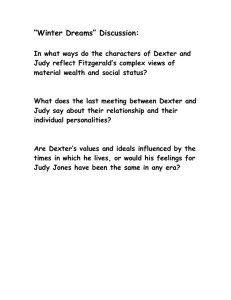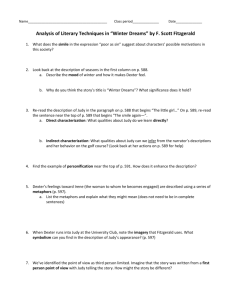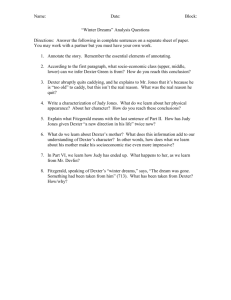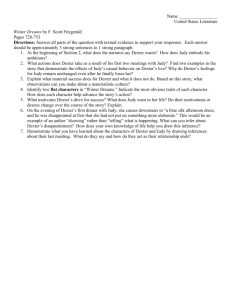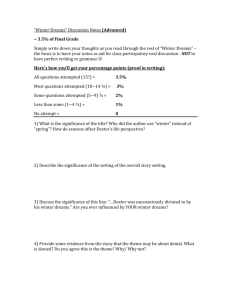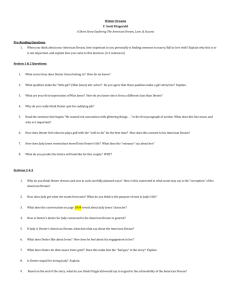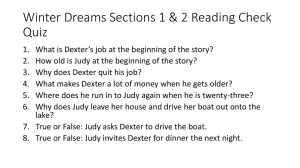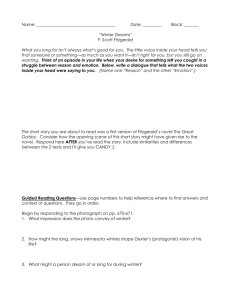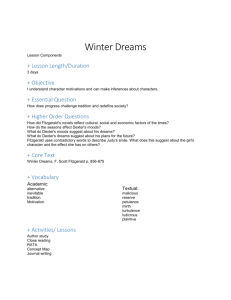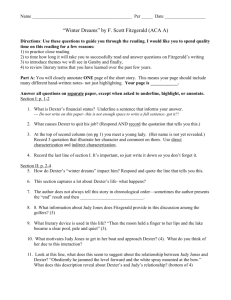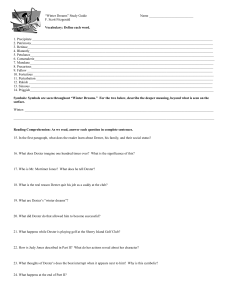Moderns
advertisement
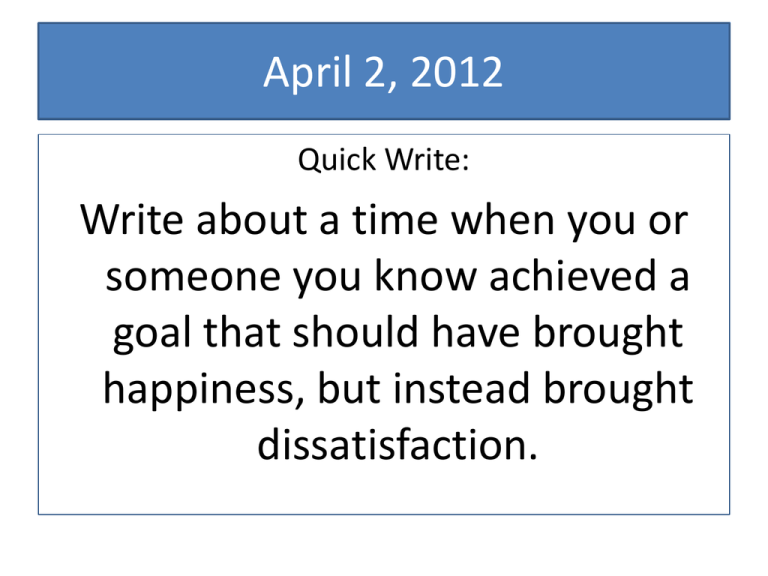
April 2, 2012 Quick Write: Write about a time when you or someone you know achieved a goal that should have brought happiness, but instead brought dissatisfaction. The Moderns: 1914-1939 • A loss of faith in the American Dream • Questioning of Puritan-based traditions that had guided American life • Rejection of sentimentality and artificiality in favor of capturing reality • Bold experimentation in style and form, reflecting the fragmentation of society • Interest in the individual and the inner workings of the human mind. Character Motivation • Motivation refers to the reasons why characters behave the way they do. • It can be internal or external, or come from multiple sources. • Characters are not always aware of their own motivations. Inferences An inference is an educated guess based on facts presented in the text and on your own life experience. • Why does Dexter want to marry Judy? • Why does Judy treat men so carelessly? • Why does Dexter propose to Irene? April 3, 2012 (Honors) Bellwork: Please answer both questions. 1. Finding details: What is Mr. Jones’s opinion of Dexter? (pg. 859) 2. Making inferences: What does the phrase “white linen nurse” suggest about Judy’s attitude towards her caretaker? (pg. 859, second column, halfway down) April 4, 2012 (Honors) 1. A recurring theme in Fitzgerald’s work is the pursuit of the American dream. What does Fitzgerald see as the American dream? What evidence from the story supports your answer. 2. At the end of the story, what loss does Dexter lament? Use evidence to support your answer. 3. A story’s climax is the point in the plot that creates the greatest amount of interest. Which event marks the climax of this story? April 4, 2012 Find your group, take out your “Winter Dreams” questions, and review your answers. Focus on your group’s questions. Be prepared to share your answers. Group 1: N and U Group 2: O and W Group 3: P and X Group 4: S and Z Group 5: T and V How does “Winter Dreams” reflect these characteristics of writing from the Modern period? • A loss of faith in the American Dream • Questioning of Puritan-based traditions that had guided American life • Rejection of sentimentality and artificiality in favor of capturing reality • A loss of faith in the American Dream • Judy represents the American Dream, and Dexter can not have her. • Dexter is not satisfied with the success that he does have. • Judy does not seem to have a clear sense of purpose. • Questioning of Puritan-based traditions that had guided American life • Judy has relationships with many men. • Dexter and Judy kiss and spend time alone even though they are not engaged or married. • Dexter spends time with Judy although he is engaged to Irene, and breaks off the engagement. • Rejection of sentimentality and artificiality in favor of capturing reality • Judy, the main female character, has many flaws that are obvious to the readers. She is not artificial and perfect, but more like a real human. • Dexter does not have a happy ending. He never fulfills all of his dreams. Modern American Fiction Short stories: 1. F. Scott Fitzgerald and “Winter Dreams” 2. William Faulkner and “A Rose for Emily” 3. James Thurber and “The Secret Life of Walter Mitty” 4. Flannery O’Connor and “The Life You Save May Be Your Own” Poetry: 1. “Chicago” by Carl Sandburg 2. “what if a much of a which of a wind” by E.E. Cummings 3. “Nothing Gold Can Stay” by Robert Frost 4. “Birches” by Robert Frost Extra: The Love Song of J. Alfred Prufrock by T.S. Eliot Modern American Fiction Review • Identify the period known as modernism: 19141939. Name some characteristics of the writing. • Understand the concept of the American dream • Identify Historical events that affect writing- WWI, Jazz Age/Roaring 20s, and the Great Depression • Describe characteristics of Southern Gothic tales • From short stories: Inferences and predictions, motivation, foreshadowing, and irony • From poetry: Style, syntax, apostrophe, allusion, symbolism April 5, 2012 (Honors) Bellwork: In a small group of 4, brainstorm specific examples of individuals or groups who choose not to accept forward movement in society. Why do you think they are uninterested in progress? How does this position affect their lives? Be prepared to share an answer from your group.
